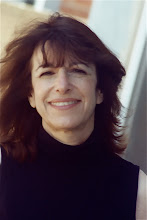Wordsworth
This is as true with picture book biographies as it is for fiction. Effective writing is all about summoning and expressing emotion. Especially when it comes to capturing the zeal and commitment of the man or woman you are portraying.
Enjoy the vigorous prose from these picture book biographies:

"His eyes move up and down, back and forth. With light steps, he follows the sweep of his brush. He stops and a pool of paint pauses. Paint, paint and more paint, dripping, pouring, flinging. "The painting has a life of its own. I try to let it come through." Jan Greenberg & Sandra Jordan's Action Jackson.
Note the upbeat rhythms. Feel the movement of the up/down/back/forth. Repetition creates emphasis. Hear those explosive p's as the paint hits the canvas.
"Colors came to life like actors on a stage! One color stepped away. Another popped forward. Colors became softer and louder...Colors even disappeared! Josef kept makin
 g painting after painting of squares...With each painting he proved that colors don't stand alone-they interact! 'I can kill the most brilliant red by putting it with violet,' he said." Natasha Wing's An Eye for Color: The Story of Josef Albers.
g painting after painting of squares...With each painting he proved that colors don't stand alone-they interact! 'I can kill the most brilliant red by putting it with violet,' he said." Natasha Wing's An Eye for Color: The Story of Josef Albers.Metaphors create imagery. Repetition for emphasis. Varying sentence length creates interest- and short sentences are more energetic. Note the contrast: "colors don't do stand alone-they interact!
 "When the billboard came into view that afternoon, what the brothers saw astonished them. From more than a mile away, it looked like the billboard was on fire! When they got up close, the Switzers didn't find any flames. Instead they discovered something even more exciting. It was just like those silk samples Bob has seen in his backyard in Berkeley: even without the ultraviolet light on, the billboard was glowing-glowing bright orange in the setting sun." Chris Barton's The Day Glo Brothers
"When the billboard came into view that afternoon, what the brothers saw astonished them. From more than a mile away, it looked like the billboard was on fire! When they got up close, the Switzers didn't find any flames. Instead they discovered something even more exciting. It was just like those silk samples Bob has seen in his backyard in Berkeley: even without the ultraviolet light on, the billboard was glowing-glowing bright orange in the setting sun." Chris Barton's The Day Glo BrothersThe power of simile, and emphatic words/phrases like "astonished" "from more than a mile away" and "even more exciting." Repetition. Contrast between sentences 3 and 4.
Poetic language enhances the drama of the story's climax.
As I continue to research my subject, I'll be looking for actions that reveal his ardor for his work. Did it start in his childhood? What were his inspirations? What lengths did he go to accomplish his goals? What obstacles did he have to overcome? Did he ever describe his love for his work?
Once you feel a deep emotional connection to the person you're writing about, once your imagination is truly engaged, the evocative language will pour forth. Capturing your subject's passion is one of the greatest challenges- and rewards- of writing a picture book biography.








No comments:
Post a Comment